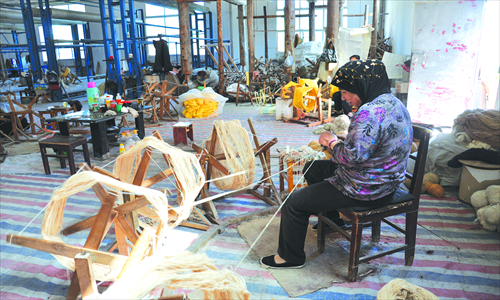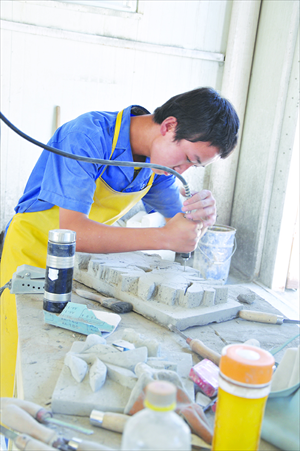Ethnic allure

Ma Yulin, 64, a Muslim worker, spins thread in a Xingqiang Carpet factory.

Zhang Xue, 16, one of the two newly recruited apprentices in a brick-carving factory, drills basic patterns on bricks. Photos: Liu Sha/GT

location of Linxia
With half of its population being Muslim, Linxia Hui Autonomous Prefecture in Northwest China's Gansu Province obviously sees the cultural and religion-related industries as a key source of its socioeconomic development.
The prefecture government has long mapped out a plan to establish itself as a "small Mecca", which could provide ethnic products targeting the markets in Muslim and Buddhist minority areas.
At the same time, the ethnic culture and sightseeing sites alongside the Yellow River have made tourism another economic growth point for the prefecture.
Zhou Qiang, secretary of Linxia Prefecture Committee of the Communist Party of China (CPC), told the Global Times on August 4 that the market for traditional Muslim products has good potential and the labor-intensive and import-oriented enterprises could provide more job opportunities.
The local GDP in the first two quarters of 2013 amounted to 7 billion yuan ($1.14 billion), increasing 15.3 percent over the same period in 2012. The per capita annual disposable income increased 18 percent to 6,957 yuan in 2013, according to the local bureau of statistics.
"We have to admit that Linxia, with 40 percent of the population living below the national poverty line [set at 2,300 yuan ($376.28) in annual net income], is one of the poorest areas in Northwest China and faces many challenges, but it is making great progress," Zhou said.
Eyeing foreign markets
Inspired by Ningxia Hui Autonomous Region which has successfully held three expositions between China and Arab states to attract investments and promote bilateral trade, the Linxia government is planning to hold an international fair of Muslim products on a yearly basis.
But the fair will be mainly a venue for the exchanges between private enterprises from Linxia, Southwest China's Tibet Autonomous Region, Northwest China's Ningxia Hui Autonomous Region and Arab countries, and unlike the annual China-Arab States Expo, held in Ningxia and organized by the local government, where senior national leaders meet, the Linxia international fair would have less government involvement, Zhou said.
Meanwhile, the prefecture government has adopted a series of favorable policies to encourage private enterprises to expand overseas.
Last year, more than 50 private enterprises ranging from carpet producers to processing plants of halal food, a type of Muslim food, enjoyed more than 11.7 million yuan of discounted loans, according to the figures from the Gansu Ethnic Affair Commission.
"The domestic markets are dotted with residential areas of ethnic groups, and now our major market is the Arab world," Zhou said.
Zhang Liqi, manager at Hailimai halal food processing plant, told the Global Times Tuesday that they used to export food through traders in Yiwu in East China's Zhejiang Province, one of the largest commodity trading centers in China, as it has better logistics systems and strong customer base.
"The Linxia government is encouraging us to expand our own customer base, and now we are trying to enter into long-term contracts with several supermarkets in Saudi Arabia," Zhang said.
Halal meat, handmade carpet and Muslim clothing are main export products of Linxia, with a combined export volume exceeding 15 million yuan in 2012.
Besides, construction of a 290-hectare logistics park for Muslim products, started in 2011, will be completed by the end of this year. Zhou said this park would help connect factories with professional transportation teams and form a mature logistics business network.
To better assist traditional industries, the local government also sells land at lower prices to private Muslim enterprises.
"Developing these traditional industries will protect the ethnic culture and also help promote national unity among the ethnic groups," Zhang Baotong, vice director of the academic committee of the Shaanxi Academy of Social Sciences, told the Global Times.
Dwindling artisans
However, with the development of modern industries in Linxia, some traditional industries are confronted with the shortage of skilled craftsmen.
Ma Xiaoxian, 60, owner of Xingqiang Carpet Cooperation, the largest handmade carpet factory in Linxia, started to consider abandoning the handiwork and switching to automated production, due to continuous loss of experienced craftsmen.
"Young people would like to work in construction sites to make 100 yuan ($16.3) a day rather than sit there patiently weaving rugs for several months," Ma told the Global Times.
There are four handmade carpet producers in Linxia but only Xingqiang Carpet has the permit to export its carpets. It generated more than 40 million yuan in annual revenue last year.
The handmade carpets are used as prayer rugs in Muslim families and mosques and also as home furnishing decorations.
"Such handmade carpets have great market potential not only in Muslim communities but also among some businessmen who like cultural creations," Ma said.
"We never lacked orders, but the problem is the shortage of craftsmen," Ma said.
Other products like brick-carving, halal food and Muslim caps and turbans, among the key cultural industries of the prefecture, are also facing the problems of skill shortage.
Mao Xingwen, owner of a local brick-carving factory, told the Global Times on August 4 that they have received so many orders that many have to be scheduled for 2014. The brick-carving has a long history in Linxia and authorities used it for their houses in the old days. Now it can be seen in many places like public squares and museums.
But Mao is also upset by the loss of experienced craftsmen. In order to get more apprentices, the factory set up an entertainment room and its own canteen. "Many of the artisans are too old, so I hope more young people could come, learn and inherit this old technique," he said.
Ma said that automated production might diminish the quality and uniqueness of the carpets, but it would greatly increase efficiency and output.